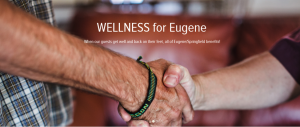As part of the service component of my fellowship with the UO Law School Environment & Natural Resources Law Center’s Food Resiliency Project, I spent several Saturdays this past semester volunteering at the Eugene Mission in the Whitaker neighborhood. During my orientation and my volunteer shifts, I learned a great deal about homelessness in our community and our country that I wanted to share with you all.
The Eugene Mission currently identifies itself as a wellness center rather than merely as a homeless shelter because of its efforts in bringing long-term solutions to homeless people rather than just emergency services. Tabitha Eck, the Community Engagement Manager at the Eugene Mission, described emergency services as immediate needs such as food, clean water, a warm, dry bed, and access to restrooms. On the other hand, she defined long-term solutions as a broad concept that included a successful transition back into the community with gainful employment, sustainable income, and stable housing. The Eugene Mission’s long-term vision interested me not only because its model contrasted fundamentally with other missions and shelters I have volunteered with, but also because its goal of effectively reducing homelessness is far more involved, sustainable, and difficult than merely meeting emergency needs.
The Eugene Mission was founded in 1956. Currently, it provides beds to homeless members of our community 140,000 times a year, and serves 265,000 nutritious meals annually. Additionally, the Eugene Mission is blessed with a sprawling 7.5 acres which includes 13 buildings for housing, meal preparation, a dining hall, and even chicken coops. The Eugene Mission receives $2+ million in monetary donations and $2 million in in-kind donations annually. Donations to the Eugene Mission are tax-deductible and an impressive 87 cents of every dollar goes towards programs.
The changing nature of homelessness both in Eugene and our country, in general, makes supporting our local shelters and missions as critical as ever. Before, homelessness in the United States was not associated with mental health issues. The Eugene Mission reports that 90% of its homeless population suffers from mental health issues. Additionally, addiction used to affect only 10% of the homeless population in decades past, but now that rate has increased to a staggering 50%. Finally, homeless populations used to nearly exclusively comprise only men and did not include women or children in large numbers. Now, for various socioeconomic reasons, women are far more financially vulnerable and are often homeless for long periods of time. Homeless women are often subject to appalling rates of assault and abuse. Additionally, homeless women are commonly caring for their children, who also become homeless. Tabitha described homeless women and children as the fastest growing homeless population in the country, and statistics predict they will eventually comprise 50% of homeless population in the United States.
The Eugene Mission prides itself on “giving a hand up, not a handout.” The Eugene Mission is happy to accept monetary and in-kind donations, all of which are tax deductible. Additionally, the Eugene Mission is happy to provide tours and take on volunteers.
To schedule a tour, please call (541) 344-3251.
To volunteer – http://eugenemission.org/volunteer/
The Food Resiliency Project addresses key environmental and policy issues relating to all stages of the food system, including production, transportation, packaging, and consumption. These issues are examined through both a local and a transnational perspective. Local resilience to natural disaster and climate change is a key theme driving communities to develop self-sufficiency in their food systems. Important issues include patents related to modified seeds, land use reform to promote urban and household food production, use of public parks and spaces as “foodscapes,” use of conservation easements to secure urban farms, impacts from genetic modification of food and genetic pollution, transition from pesticides and herbicides, legal incentives to promote carbon sequestration in farming practices, global food trade, and international frameworks to ensure food sovereignty, security, and justice, among many more.
Thank you to Eugene Mission’s Senior Director of Operations, Dana Gray, and Community Engagement Manager, Tabitha Eck, for verifying the accuracy of this blog post. Images courtesy of the Eugene Mission.




